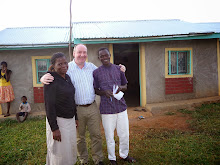Today we
rose early, for the drive to visit two of our boys, Shadrack and Victor. They
live close to each other, in Busia County, near to the Uganda border.
We set off on the familiar airport road passing through Maseno and Luanda but then, unlike yesterday when we turned towards Siaya, we continued on the main western highway.
We set off on the familiar airport road passing through Maseno and Luanda but then, unlike yesterday when we turned towards Siaya, we continued on the main western highway.
It may be
something of an exaggeration to call it a highway, but the road was relatively
pot hole free and we made quick progress.
“Can you
believe that?” said Moses, pointing at a motor bike just ahead of us loaded
down with a three piece suite (yes, that is what it said!).
Paul James
and I sat marvelling at the balance and inventiveness required to strap three
large items of furniture onto a small 200cc motorbike and then to ride it on
the same roads as the huge lorries and speeding matatus that hurried up and
down between Kisumu and Busia.
I have
grown accustomed to remarkable sights, bikes carrying three or four 90kg sacks
of maize, iron roofing sheets strapped on cross ways, so the protrude into the
highway and only this morning in Kisumu I watched a small boy carrying 5
chickens, their legs tied together with raffia so they couldn’t escape, jump
onto the back of a boda boda and head home.
But this
was a first. I have never seen a three piece suite on a bike before.
We pulled
over in Bulaga to buy a small bunch of ripe banana’s from one of the many
roadside sellers, who wait for the matatus to pull in before standing at the
windows earnestly selling their fruit. The bananas were sweet and tasty and we
ate them late in the morning as we made steady progress. We drove through Yala
and Ugunja, before turning off the main road onto a dirt track, heading down
towards the Northern end of the Lake. After another half hour we turned onto a
smaller track and then onto smaller and smaller routes, made by and for
bicycles, but down which the little Toyota wondered with ease.
Eventually
we arrived at Victor’s place.
Victor has
been with us for about 4 and a half years, living in our smaller centre at Mamboleo
with Paul James. He found his way to the streets when he was very small, after
running away from home.
Apparently
he was running an errand to the shops and was given money, but lost the change
and was frightened to go back. By whatever transport he could, he eventually
found his way to Kisumu, where we met him in one of our outreach programmes.
After a
year or so we traced back to his family, who were overjoyed to see him and know
that he was alive and well. Victor has been doing well in school and has just
completed class 5 at primary (of 8 classes).
We walked
into the small compound and found his mum and dad there, laying out cassava to
dry in the afternoon sun. Traditional mud and thatch huts made up the
accommodation and Victor’s dad ushered us into the main house, which was airy
and cool. Paul James has been here often during the resettlement program, but for Moses and I this was our
first visit. It was lovely to meet and talk with Victor’s parents, and they
were so full of thanks for all that has been done for them, bringing their son
home.
After a
number of visits, Victor asked Paul James if he could resettle back at his
parents place, so now, at the end of the school year, he has moved from
Mamboleo back to home. We couldn’t be more delighted for him. He has already
made friends in the community and will start at the local school in January. We
will, of course, continue to support his education and we wish him and his
family every blessing.
We left
Victor and made our way to Shadrack’s house, which he shares with his
grandmother. Shadrack has just completed secondary school and we are waiting
for his results, which will be out in February. Our hopes and prayers are for a
successful result, that he might realise his dream of going to college.
We made our
way back to Kisumu full of talk about the different programs we run and about
the hopes and dreams we have for the children. I have seen many on this trip
that are taking their first steps to an independent life, standing on their own
feet. It is a difficult process, but one that is seeing some success.
Balancing
the needs of many different children is as hard as balancing a three piece
suite on a motor bike and driving on a public highway.
But that
doesn’t mean it can’t be done.






